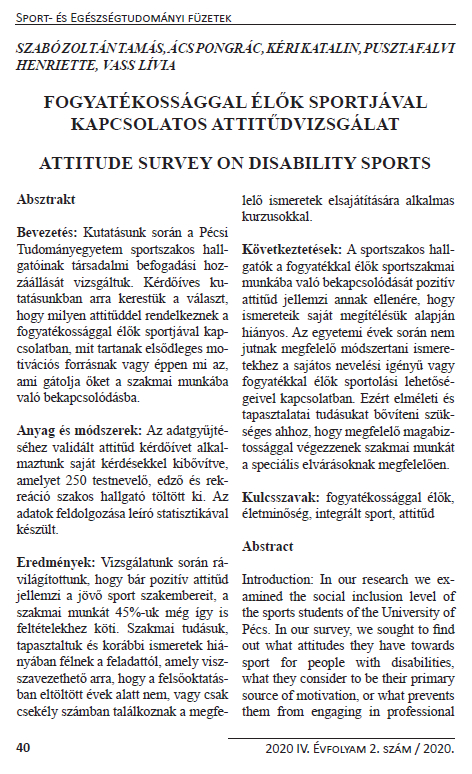Fogyatékossággal élők sportjával kapcsolatos attitűdvizsgálat [Attitude survey on disability sports]

View/
Date
2020Author
Szabó, Zoltán Tamás
Ács, Pongrác
Kéri, Katalin
Pusztafalvi, Henriette
Vass, Lívia
Metadata
Show full item recordAbstract
Szerzők: Szabó Zoltán Tamás; Ács Pongrác; Kéri Katalin; Pusztafalvi Henreiette; Vass Lívia | Cím: Fogyatékossággal élők sportjával kapcsolatos attitűdvizsgálat | Sport- és Egészségtudományi Füzetek (ISSN [print] 2560-0680 / ISSN [pdf] 2560-1210) | DOI: 10.15170/SEF.2019.04.02 | IV. évf., 2020/2. sz., 40-55. o. | Licenc: CC-BY-NC-ND 4.0 --- [Attitude survey on disability sports] --- Introduction: In our research we examined the social inclusion level of the sports students of the University of Pécs. In our survey, we sought to find out what attitudes they have towards sport for people with disabilities, what they consider to be their primary source of motivation, or what prevents them from engaging in professional Materials and methods: For the purposes of our study, we used a validated attitude questionnaire supplemented with our own questions, which was completed by 250 students (Physical Education, Sport Trainer, and Recreational Studies) of University of Pecs between the ages of 18 and 32. The data acquired was analysed by statistical tests. Results: Our study revealed that while there is a positive attitude among future sport professionals but the professional work would be conditional on their part. Due to their professional knowledge, experience and lack of previous knowledge, they are afraid of the job. According to their answers, it traces back to the fact that they do not meet the courses necessary for acquiring the appropriate knowledge and training during their years in higher education. Conclusions: Despite the positive attitude, the involvement of sport students in professional work is still a question. During the university years, they do not have the appropriate knowledge and practice to carry out confident professional work in an environment with special educational needs.
